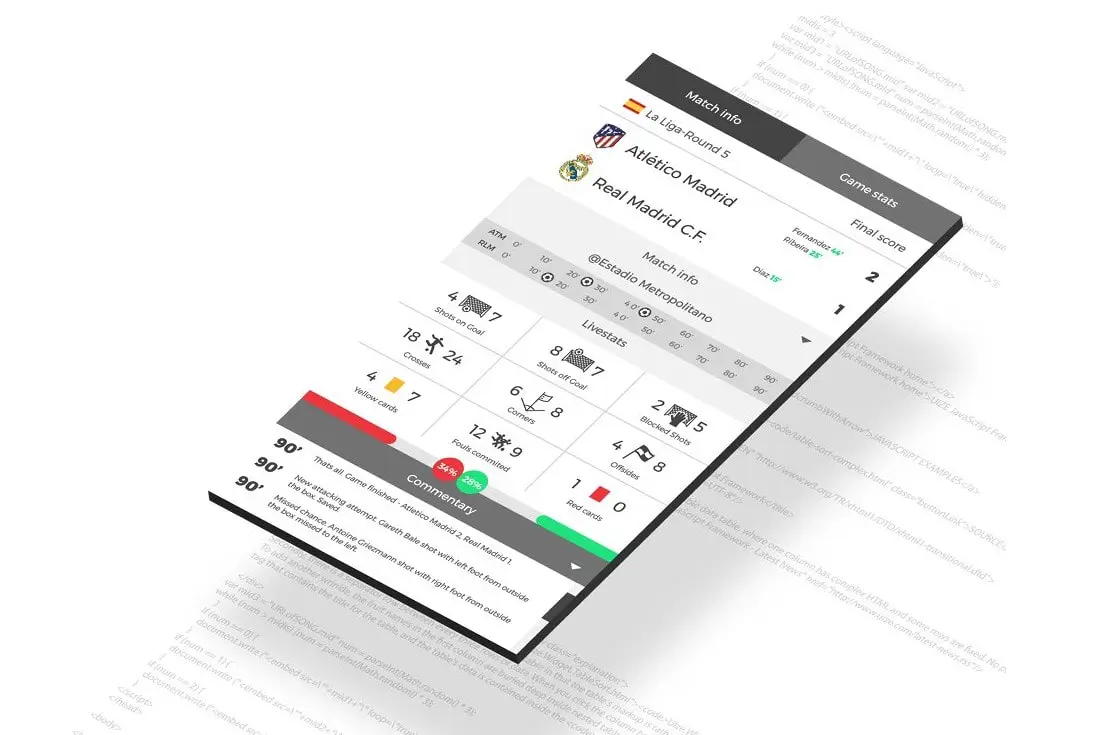
How To Choose A Sports Data Provider
As new sports data providers open every year, navigating pricing and data options has become a challenge in finding the best value. This guide outlines a few of the main points to consider when comparing APIs. Data coverage, budget and projected time to market are the major factors in choosing an API. Finding a provider with the correct data types, sports coverage, customer support, service guarantee and API pricing are further considerations. The API Directory allows for filtering between these options and more. Below are a few the major factors which should be considered when comparing the best sports data companies.
Sports App Type
One of the first goals is to clearly define the type of app being built. A fantasy football app benefits from specialized data types versus a sports website dedicated to news and match analysis. Building a football stats and scores app is more straightforward and requires fewer statistics than a sports betting app developed with user engagement in mind. It is important to define the scope clearly before beginning your search.
Sports Data Coverage
Companies that specialize in data for a featured sport while also including basic stats on additional sports is a good foundation to start from. For example, an NFL stats API that specializes in fantasy football ensures rich features and data quality. If they also include an MLB API, the app can be expanded with fantasy baseball app development later. Consider which sports the website may grow into when choosing an API to partner with. Most providers have proprietary data structures with unique IDs that are not compatible between platforms. Signing on with a different vendor to expand sports coverage at a later time can double server and database development costs.
Stats Types
Most sports data providers offer a live scores API, schedules, results and basic statistics in their coverage, but there may be additional requirements such as fantasy sports data, historical statistics, odds APIs, sports news, analysis, or team logos needed to power your app. To differentiate from competitors, many sports companies specialize in one or more of these categories (For example, sportsbook data feeds or NFL fantasy APIs). The added level of detail can be used to enrich content for your target audience.
If a provider offers sports widgets for websites, data types can be even more specialized and range from live video highlights to transfer news and live play-by-play animation. The API Directory allows for filtering between providers using all of these categories.
Historical League Stats
Not all vendors offer historical stats. When available it is for different periods of time. This is an important inquiry if required in your project. Pricing on historical datasets is a further consideration. Some APIs include it in their plans while others charge a one time fee to download the entire historical database.
How Much Does A Sports API Cost?
Most sports providers do not list prices, and you can reasonably expect to pay upwards of $10,000 per year for basic plans. However, in the past decade several new companies have opened with developer-friendly pricing. Many have live data starting at under $100 per month. There are trade-offs in quality, data richness and level of customer support. Business requirements and revenue ambitions should guide the decision between low and high end cost options.
Project budget correlates closely with expected future revenue. An affordable API advantages the hobbyist developer with low cost starting plans and free sports data. That scenario makes less sense for the venture capitalist who wants to grow a large online presence with corresponding revenues. Projects with these goals should opt for a contract including a dedicated account manager to ensure reliability and uptime. To gauge potential income, research revenue models which have been successful for competitors.
If you are interested in news on discounts, specials and price updates, sign up for our newsletter. We'll send an update as soon as they drop!
Are There Any Free Or Cheap Sports Data APIs?
If your project requires real-time scores, the short answer is no. There are too many data points in a livescore time series for free APIs to be feasible. Companies can offer a free plan which provides access to a few leagues and limited number of requests per day. This is ideal during the development period of a complex app, but doesn't have the depth needed to power most websites.
Sports stats databases are available around the web, but live scores and advanced stats always come with a fee. BallDontLie offers a free NBA API with scores delayed by 10 minutes. Another option for personal and private apps is MySportsFeeds. They offer a free or discounted plan on non-commercial projects, making them a good choice for students or hobbyists building private apps like a fantasy football office pool.
Data Plan Options
In most cases, plans are charged monthly or annually and include a rate limit on each endpoint. Sports stats companies can also provision a set number of API requests each hour, day or month, and charge extra for additional calls that go over the limit. Some vendors forego subscription fees altogether and charge a base rate per API call. The final decision should depend on a business's particular requirements, and in most cases it is better to choose an annual plan as the savings can be significant (up to 50% off at Goalserve).
Multilingual Support
If your audience is multilingual, language support is an important consideration. Most providers offer english support and leave translation to the customer (which can be performed manually using a Natural Language Processing library). However, several vendors offer multilingual support out of the box and can aid in reaching a wider audience from the start.
Reliable Sports Data Providers
Service-Level Agreements guarantee a certain amount of uptime and data quality over a specified period (usually 12-months), but are not offered by all companies. For some businesses that is a make or break decision. Vendors with enterprise-level options include these in each contract.
Customer support and response time can be important depending on your business uptime requirements. Most companies advertise 99.9% uptime, but in effect that doesn't mean much outside of a formal contract. Every company offers email support, and others offer phone, live chat and ticketing as additional contact methods. A few companies have dedicated account managers who are available 24 x 7 to enterprise clients.
Company age is an important indicator of reliability. Established companies like Statsperform and SportRadar have been publishing live statistics since the early days of the internet and can be considered dependable. In fact, Stats and Motorola won a court case in 1997 against the NBA which established a precedent for fair use laws in sports data for the United States. The district court held that Motorola and STATS did not infringe NBA's copyright because only facts from the broadcasts, not the broadcasts themselves were transmitted.
In recent years there have been a number of new APIs without business details published to their website. These companies should be approached with caution as they can close down without accountability. The API Directory is useful in filtering between new and old companies based on the date they were founded. Choose companies which have maintained their reputation as reliable sports data providers.
Sports App Development Considerations
If hiring sports app developers is in your launch plan, there will be a time investment for setup and configuration before publishing your app. Some stats providers make it easy to get started by developing SDKs, library wrappers, code samples and other helpful documentation. It is important to research how well a provider's API is documented to maximize value from your development budget.
Companies at higher price levels have the option of pushing their entire sports database to your server and automating live updates with websockets. This route can also save development time, skipping much of database design and coding logic normally required to pull data from multiple endpoints. It has the additional benefit of increased efficiency in update times.
Historical datasets for leagues are offered as a download or pushed to the client's server as a one-time event during setup. Historical databases can be upwards of 50 GB for multiple sports. This can be useful for pre-configuring the structure of your database to accept live scores afterward.
App Development Time
Every company includes a short trial period for testing (about 2-8 weeks) while others offer a free plan to allow for unlimited testing. SportMonks is a good example, offering a free soccer API with access to two leagues and limited requests. Companies that include a contract can be open to negotiating lower fees or even negating them altogether during the development period. Depending on the complexity of the application, development times can last anywhere from a few months to over a year.
If you have questions about sports app development or pricing, feel free to contact us for insight into building a sports app from scratch.
Storage Requirements
Historical datasets are the biggest memory consideration when looking at storage options. Databases for multiple sports can be upwards of 50 GB and cover 30 years or more for mainline stats. Detailed stats are not available pre-1990 (although some companies are implementing new technology to retroactively add these). Depending on the amount of leagues covered (in soccer, this can be up to 2000+ worldwide leagues) and depth of detail, live data requires less space and a total storage space of ~100 GB should be the upper limit for most implementations.
Sports Widgets And White Label Solutions
Businesses which have not hired an app development company yet can consider using Widgets and White Label Solutions. Sports widgets for websites are easy to integrate, require very little coding knowledge and bypass the design and coding phases required when working with raw data. The drawback is higher prices with additional charges as website traffic grows. That can be balanced against the cost saved in development.
An additional circumstance where widgets are convenient is for current website owners who want to test new features that increase engagement with their audience. Quickly gaining insight into your app visitors' likes and dislikes can help efficiently prioritize new features.
White Label Solutions are a fast-to-market option that bypasses the development phase and publishes a turnkey app with your company's branding. There are several live score and white label sportsbook options available. This is the simplest but most expensive option as the data provider maintains infrastructure and serves content directly to your audience. Businesses seeking a managed solution with quick setup time will favor this solution.
These are a few of the main considerations that should be researched before choosing a sports data provider. If you have further questions not covered here or in the FAQ, please contact us. We look forward to your feedback.
